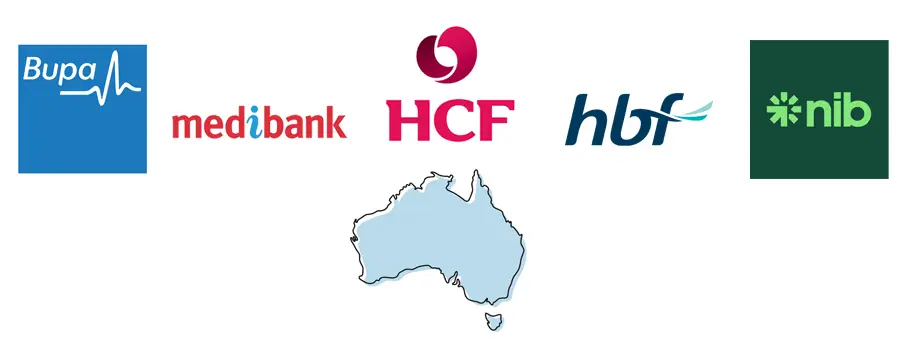
Question: Do I need private health insurance?
Some benefits of health insurance
- the option to choose your own private doctor
- the option to attend a private hospital or facility
- avoid the public waiting lists for surgery
- accommodation in a private room
- extras cover for things like dental, optical, physio, etc.
- state-wide or national ambulance cover
- tax benefits: avoid the Medicare Levy Surcharge
- avoid Lifetime Health Cover Loading penalties

Do I need health insurance when I have access to medicare?
All Australian residents and citizens (and some eligible VISA holders) have access to our free, public healthcare system known as Medicare. Medicare gives us access to public hospitals for our personal medical needs and surgeries, which is also known as an in-patient service. Medicare also gives us access to a spectrum of ‘out-patient’ services such as visiting a GP, specialist or diagnostics (imaging, tests, pathology, etc.). Medicare is funded by all tax-payers in Australia; we all pitch in to afford our public health system through the Medicare Levy tax.
When someone who is entitled to full Medicare benefits goes to a public hospital for treatment, it is often completely cost-free with little or no out-of-pocket expenses. You are assigned a public doctor through a referral from your GP or, if an emergency, whoever might be on duty at the time. Public Hospital stays generally include accommodation in a shared room with other patients.
The public hospital system is also subject to availability and waiting lists. In short, some medical procedures or services have a waiting list before you can receive treatment. This is due to the heavy load of Australians using the public health system and our public hospitals. Some procedures can have waiting-list of up to 2 to 3 years! Another contributing factor is that Medicare uses a category system that prioritizes patients that require more immediate treatment, broken down into Categories 1, 2 and 3.
Category 1 is urgent, followed by 2 as being semi-urgent and 3 not so urgent (to put it simply). The logic behind this system is sound at first look but it is far from perfect. Being in a lower risk category does not mean the patient is not in pain or discomfort and being in an urgent category does not automatically remove all waiting lists. There are some high-demand procedures that even a Category 1 might have to wait for. This can cause an already stressful time in one’s life to be drawn out unnecessarily.
Public hospital vs private hospital
Private Hospitals are privately owned medical facilities not funded on a local, state or federal level, and Australia has over 600 Private Hospitals housing over 33,000 beds. One of the most attractive benefits of a Private Hospital stay is your own private room (some say the food is better too). On a more holistic and functional level, a major benefit of the private hospital system is that it takes pressure off the public system by freeing up public beds and doctors. A doctor or surgeon that performs in-patient services in a Private hospital is known as a Private Doctor.
Medicare does not cover the full cost for accommodation in a private hospital or for a private doctor’s fees for surgery. Simply put, you will incur very significant out-of-pocket costs for private medical treatment without any Private Hospital cover.
The public system also does not cover lifestyle health services such as Dental, Physiotherapy, Chiropractor or Osteopath, Remedial Massage, Podiatry, Glasses, and Contacts (Optical) plus a multitude more. These are the kind of services an Extras policy will cover. It can be said that private health insurance is a product that steps in where Medicare and the public health system ends. It’s not a case of one or the other, but more so that Medicare and private health insurance can complement and work in conjunction with each other.
What sort of things can an extras policy cover?
Extras can cover the insured for related costs associated with the following health services. This list is just a snapshot and does not detail all health services that can be covered on a health insurance extras policy.
- General & Preventative Dental
- Major Dental
- Orthodontics
- Remedial Massage
- Acupuncture
- Podiatry & Orthotics
- Speech, Eye and Occupational Therapy
- Health Management program
- Non-PBS Pharmaceuticals
- Optical
- Exercise Physiology
- Physiotherapy
- Chiropractic
- Osteopathy
- Myotherapy
- Psychology
- Medical Aids & Appliances
- Dietitian & Nutritionist
How does extras cover work?
When looking at an Extras policy you will find that each service is broken down into an Annual Limit and a Rebate.
An extras Rebate is how much the fund will pay for the service or consultation when you make a claim, and the Annual Limit is a dollar figure cap of which a fund will stop paying out on a service each year. Example: each time you go to the Physiotherapist your health fund may contribute $40 of the consultation (rebate) until you reach a cap of $500 in Physio payouts total for that calendar or financial year (annual limit).
When claiming for an Extras benefit, most of the time your health provider will have a terminal linked up to Hi-Caps so that you can swipe your private health insurance membership card and the point of sale. This means the rebate from your health fund will be subtracted from the service fee and you will only have to pay the gap (the difference), if any. If you health provider does not have automatic claiming through Hi-Caps, you will need to pay the service in full, retain your receipt and make a manual claim direct to your health insurance company online, over the phone or by filling out a form.
Do I need extras health insurance?
You do not need to require all of the items in the list above to make good use of an extras policy. Just like with private hospital cover, Extras come in different levels of cover that include and exclude different things. A Basic Extras policy generally includes basic dental, optical and some therapies, whereas a Comprehensive Extras policy (also known as Top extras) can include the whole spread. Most funds also offer mid-range covers that can include any combination of services, there’s no universal yardstick when it comes to comparing health insurance funds.
No two extras policies or funds are the same, all offering different degrees of cover and payouts when you claim. This is why comparing health funds is so popular in Australia. Services such as Cut the Cost can help you identify what your extras needs are and then help you compare some health funds and match you to a policy that has great payouts for the services you will use, but at a low premium.
Continued below…

Do I need extras health insurance?
Let’s start with a very common scenario: you go to the GP for an ailment or medical issue and your doctor refers you to a specialist. You call the specialist and book a consultation and before you know it you’re sat in a consultation room being told you need surgery. It could as simple as a colonoscopy, or as complex as brain surgery. In fact, there are over 2,500 registered medical procedures with Medicare. You’re told that the public waiting list for the required procedure is approximately 3-6 months (or anything up to 2 years), unless, of course, you have the correct level of private health insurance and have served your waiting periods. If so, the procedure can be done straight away in a private hospital, more often than not with your own private room.
Some doctors and specialists will only perform surgery in a private hospital, therefore patients without the correct level of cover must either find another doctor or fork out thousands of dollars to have the procedure done without insurance.
Holding a private hospital cover policy can also cover you as a private patient in a public hospital. This should only ever really be required if the public hospital has private rooms (which is very rare), or if your choice of private doctor is willing to do the surgery in a public bed. However, this does not help you avoid public waiting lists for the procedure.
Out of pocket expenses
Even with health insurance private surgery is rarely cost-free. The most common out-of-pocket expenses related to a stint in a private hospital is your excess, the doctors’ gap and sometimes some other medical services related to your stay.
Private Hospital cover almost always comes with some excess options. An excess on your health insurance is very similar to an excess on car insurance, being an agreed amount you will have to pay if you make a claim. Having an excess on your hospital cover lowers the premiums – the higher the excess, the lower the cost. The most common excess options that a health fund offers on their policies are a $500 excess, $250 excess and Nil. (Please note: this is generalized information and may differ from product to product between funds).
Your doctor and anesthetist can also charge a gap for the procedure. Health insurance covers you to 100% of the Medicare Benefit Schedule (MBS) fee, however, your private doctors can charge whatever they like above this fee which you will need to pay. It’s important to discuss any gaps with your doctor/s before going ahead with any procedures. You can also ask them for a Financial Consent Form to sign before booking in any surgery to help avoid any unwanted surprise doctor’s bills.
Finally, some other medical services as part of your private hospital stay may incur out of pocket expenses including (but not limited to) pathology tests, pharmaceuticals, imaging, diagnostics and/or Emergency room fees. It can all depend on which fund you are with and which hospital you go to. Nothing is set in stone, so the absolute best thing can do is ask questions to your doctor and health fund before the surgery is done.
Levels of hospital cover
Private Hospital cover comes in different levels of cover which all health funds must categorize into Basic. Bronze Plus. Silver, Silver Plus and Gold. The difference between these levels of cover is whether -or-not- a category of procedures are included or excluded from your cover. it’s really important you ensure that your police includes the procedures you want or need cover for. Here is a list of the clinical categories that a private hospital insurance policy may include or exclude
- Accidents
- Back, neck & spine
- Blood
- Bone, joints & muscles
- Brain & nervous system
- Breast surgery*
- Cataract surgery
- Chemotherapy, radiotherapy & immunotherapy for cancer
- Cochlear hearing devices/implants
- Dental surgery
- Diabetes management (excl. prosthesis/implants)
- Dialysis/Chronic renal failure
- Ear, nose & throat
- Elective cosmetic surgery
- Eye (excl. Cataracts)
- Gastrointestinal endoscopy
- Gynaecology
- Heart & vascular
- Hernia & appendix
- Insulin pumps
- IVF/Assisted reproductive services
- Joint reconstructions
- Joint replacements
- Kidney & bladde
- Lung & Chest
- Male reproductive system
- Miscarriage & termination of pregnancy
- Pain management
- Pain management w/ device
- Palliative care
- Plastic & reconstructive surgery*
- Pregnancy & birth
- Psychiatric services
- Rehabilitation
- Skin
- Sleep studies
- Tonsils, gromits
- Podiatric surgery by an accredited podiatrist
Levels of hospital cover
Private Hospital cover comes in different levels of cover which all health funds must categorize into Basic. Bronze Plus. Silver, Silver Plus and Gold. The difference between these levels of cover is whether -or-not- a category of procedures are included or excluded from your cover. it’s really important you ensure that your police includes the procedures you want or need cover for. Here is a list of the clinical categories that a private hospital insurance policy may include or exclude
- Accidents
- Back, neck & spine
- Blood
- Bone, joints & muscles
- Brain & nervous system
- Breast surgery*
- Cataract surgery
- Chemotherapy, radiotherapy & immunotherapy for cancer
- Cochlear hearing devices/implants
- Dental surgery
- Diabetes management (excl. prosthesis/implants)
- Dialysis/Chronic renal failure
- Ear, nose & throat
- Elective cosmetic surgery
- Eye (excl. Cataracts)
- Gastrointestinal endoscopy
- Gynaecology
- Heart & vascular
- Hernia & appendix
- Insulin pumps
- IVF/Assisted reproductive services
- Joint reconstructions
- Joint replacements
- Kidney & bladde
- Lung & Chest
- Male reproductive system
- Miscarriage & termination of pregnancy
- Pain management
- Pain management w/ device
- Palliative care
- Plastic & reconstructive surgery*
- Pregnancy & birth
- Psychiatric services
- Rehabilitation
- Skin
- Sleep studies
- Tonsils, gromits
- Podiatric surgery by an accredited podiatrist
Benefits of private hospital cover
A Private Hospital cover policy can benefit you by:
1) Covering you for accommodation and other associated medical costs as a private patient in a private or public hospital
2) allowing you to choose your own private doctor or specialist;
3) has tax benefits if you have a taxable income of above $90,000 per annum as a single person or $180,000 as a couple/family; or
4) help you avoid accruing Lifetime Health Cover Loading (LHC) if you are 31 years old or above.
Hopefully the information in this article has helped answer the question of if you need private health insurance. If you’re still a little confused, contact us and speak to one of our health insurance advisers. We can answer any questions you have and get a quote to your inbox after a brief chat.






